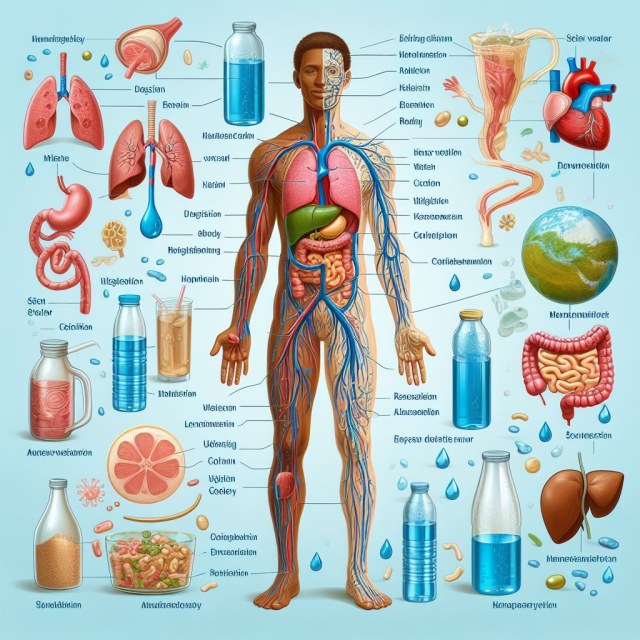Water, that transparent, colorless liquid that seems so simple, is actually an essential component for life on Earth and, especially, for our human body. Beyond quenching our thirst, water plays a critical role in a wide variety of physiological functions that keep our bodies functioning optimally. In this article, we will explore in detail the importance of water for our health and well-being, delving into its functions, benefits and strategies for proper hydration.
Functions of Water in the Human Body.
Water is the universal solvent, meaning that it is capable of dissolving a wide range of substances and carrying them through our body. This unique property of water is fundamental to its role in several essential bodily functions:
Nutrient Transport and Waste Disposal:
Water acts as a transport medium for essential nutrients that our body needs to function properly. From digestion to absorption and distribution of nutrients through the bloodstream, water plays a crucial role in every step of the process. Additionally, water also helps eliminate waste and toxins from the body through urine, perspiration, and breathing, ensuring proper balance in our system.
Corporal temperature regulation:
Our body regulates internal temperature through a process known as thermoregulation, and water plays a central role in this process. When we are exposed to extreme temperatures or perform intense physical activities, our body produces sweat to cool itself. Sweat, composed mainly of water, evaporates on the surface of the skin, dissipating heat and maintaining a balanced body temperature.
Lubrication of Joints and Tissues:
Water acts as a natural lubricant in the joints and tissues of the body, helping to reduce friction and facilitate smooth movement. Additionally, water also contributes to tissue elasticity and flexibility, which is crucial for maintaining the health and optimal function of our muscles, tendons and ligaments.
Impact of Water on Health and Wellbeing.
The importance of water for health and well-being is undeniable, and its impact is reflected in a series of benefits for our body and mind:
Improves Brain Function:
Water is vital for the proper functioning of the brain. Even mild dehydration can negatively impact concentration, mood, and cognitive function. Staying adequately hydrated can improve mental clarity, concentration, and cognitive performance, allowing us to stay alert and focused throughout the day.
Promotes Digestive Health:
Adequate hydration is essential to maintain the health of the digestive system. Water helps break down food, facilitates the passage of waste through the digestive tract, and prevents problems such as constipation and indigestion. Additionally, water also lubricates the lining of the intestine, promoting smooth and efficient digestion.
Supports Kidney Function:
The kidneys are responsible for filtering waste and toxins from the body and producing urine to eliminate them. Adequate water intake is crucial to maintaining optimal kidney function and preventing problems such as kidney stone formation and kidney failure. Water helps dilute minerals and toxins in urine, reducing the risk of blockages and promoting kidney health.
Promotes Healthy Skin:
Water is a major component of skin and plays a key role in its health and appearance. Adequate hydration helps keep skin hydrated, soft and supple, reducing the risk of dryness, irritation and premature aging. Additionally, water helps remove toxins from the body through sweat, which can help prevent problems such as acne and rashes.
Strategies for Adequate Hydration.
To stay properly hydrated and enjoy the many health and wellness benefits of water, it is important to follow a few simple strategies:
Drink Water Regularly:
Be sure to drink water regularly throughout the day, even if you don't feel thirsty. Thirst is a sign that your body is already dehydrated, so it's important to stay hydrated even before you feel thirsty.
Keep a Water Bottle on Hand:
Carry a reusable water bottle and fill it regularly to ensure you have constant access to water throughout the day. Keeping a bottle of water on hand will remind you to drink regularly and facilitate consistent hydration.
Vary Your Hydration Sources:
In addition to drinking water directly, you can also get fluids from other sources, such as fruits and vegetables, soups, smoothies, and teas. These foods and drinks not only contribute to your total fluid intake, but they also provide a variety of health-beneficial nutrients.
Water is an essential component of our existence and plays a vital role in our health and well-being. From transporting nutrients to regulating body temperature and eliminating waste, water is essential for virtually all functions of the human body.
By prioritizing proper hydration and ensuring we consume enough water throughout the day, we can stay healthy, energetic, and functioning at peak performance. Water is the elixir of life, and by taking advantage of its numerous benefits, we can enjoy a full and active life, full of vitality and well-being.






